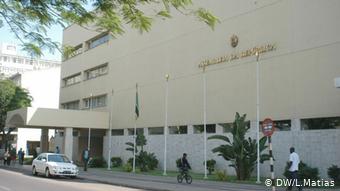Mozambique: President Chapo heads to Brazil for COP30 climate summit
Mozambique’s big fat ‘reintegration of deputies’ allowance: “A higher dimension of corruption”?

FILE- Adriano Nuvunga, director of the Center for Democracy and Development. [File photo: DW]
“The deputies, on the one hand, allow the government to do and to undo, and in return they are allowed to pass this type of law (the social reintegration of deputies) for their own enrichment,” says Adriano Nuvunga of CDD Mozambique.
On April 6, the Mozambican Parliament approved the budget for the social reintegration of deputies, a kind of retirement ‘jackpot’ guaranteeing the continued enjoyment of perks after the end of their term. With no one to stop them, they bestow upon themselves eye-popping privileges, when compared to the living conditions of the majority of the population, a majority which, through taxes, maintains their representatives in comfort.
For Adriano Nuvunga, director of the Centre for Democracy and Development (CDD), “the problem lies in the legitimacy of this payment. It is a legal payment because it was approved by the 2014 law and what deputies are doing is executing it. But it is illegitimate, and this is the main thing, in the context of the uncertainty of Covid-19, in which many workers are losing their jobs”.
Do the rich get richer and the poor get poorer?
With “almost perfect” timing, the government last week expressed doubts, because of Covid-19, about this year’s salary increase. Is this just another case of “the rich get richer and the poor get poorer”?
The director of the CDD considers the paradox.
“The table of social consultation where the increase in the minimum wage was being discussed has been suspended, precisely because what is at stake is whether the workers will keep their jobs or not, but the deputies want to have all the perks at this point. ”
Mozambique: Covid-19 brings minimum wage negotiations to a halt – Watch
But it is not just abuse of the population. There are laws that will not have been taken into account, which leaves people questioning: [is this]a lack of knowledge, a lack of respect or an intentional violation. In any event, it should be unacceptable to Parliament.
The Centre for Public Integrity (CIP) contests the approval of the [reintegraton] subsidy.
“it is clear that the deputies who approved their own statute will benefit from it, and legislated for their own benefit and in ‘propria causa’ [making a decision where their own interest is at stake], which the Public Probity Law forbids.”
Did deputies discount or not?
Faced with the scandal that the case provoked, Frelimo deputy Galiza Matos Jr. justified to the national press that the privileges come from contributions that the deputies had made from their own salaries. But lawyers challenge the former Frelimo deputy, citing paragraph 2 of article 45 of Law no. 31/2014 of 30 December, which states: “the payment of the reintegration allowance does not imply any contributions.”
“This payment is not reasonable in two ways,” Nuvunga contends. “First it is an additional expense which does not result from deputies’ contributions. And it resorts to taxpayers, in a [state] budget that runs a deficit year after year.”
The CDD director’ counter-arguments multiply.
 “The second aspect is that it is not justified because the deputy is not like those in other areas of sovereignty, namely the judges and the members of the executive, who work from 1 to 30 [each month]. Well, the deputies work seasonally and continue to exercise their original activities from where they left off, and when they finish their mandate they return to the same positions with 50% of the time counting, that is, they were counting from the time they were absent, that is, the deputy has been receiving [half a salary]. There is no parallel in society to justify [this].”
“The second aspect is that it is not justified because the deputy is not like those in other areas of sovereignty, namely the judges and the members of the executive, who work from 1 to 30 [each month]. Well, the deputies work seasonally and continue to exercise their original activities from where they left off, and when they finish their mandate they return to the same positions with 50% of the time counting, that is, they were counting from the time they were absent, that is, the deputy has been receiving [half a salary]. There is no parallel in society to justify [this].”
DW sought a reaction from deputies to this issue, but has yet to obtain a response.
How big are their egos?
DW has not yet determined whether the budget was approved unanimously, but it is worth remembering that, in parliament, the opposition and the party in power rarely share the same position. It remains to be seen whether the unprecedented has materialized on this occasion.
Even without clarification, certain sectors question the real interests of the deputies in the so-called ‘Mother House’. How do they argue that the interests of the people are what guide them? Wouldn’t it be ethical and common sense to refuse a privilege that only promotes inequality and injustice?
“The deputies, in my view, shared the booty of the state, in a sense that, on the one hand, they let the government do and undo and in return are allowed to pass these types of laws for their own benefit. Otherwise it would not be possible. It is, in fact, a superior dimension of political corruption,” the director of the CDD claims.
The deputies budgetary bonus comes just as Mozambique is experiencing an unprecedented financial and economic crisis, resulting from hidden debts valued at around two billion Euros. Hence the unasked question: Where will the government go to get money? Resort to the taxpayer’s pocket, it is suspected.
In view of the irrationality of the case, Mozambican civil society on Thursday (17.04) demanded that parliament repeal the regulation, the Budget Monitoring Forum claiming that “the amount approved for deputies’ reintegration allowances is too high for Mozambicans [to tolerate]”.












Leave a Reply
Be the First to Comment!
You must be logged in to post a comment.
You must be logged in to post a comment.